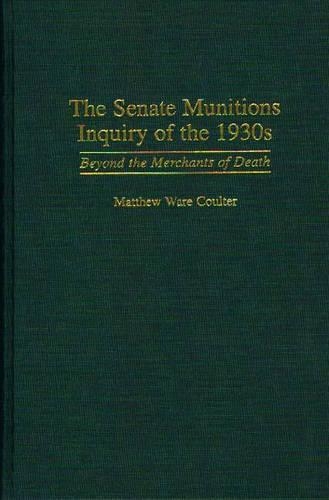
The Senate Munitions Inquiry of the 1930s: Beyond the Merchants of Death
(Hardback)
Publishing Details
The Senate Munitions Inquiry of the 1930s: Beyond the Merchants of Death
By (Author) Matthew W. Coulter
Bloomsbury Publishing PLC
Praeger Publishers Inc
23rd July 1997
United States
Classifications
Tertiary Education
Non Fiction
Second World War
Modern warfare
Manufacturing industries
International relations
Arms trade
338.4762340973
Physical Properties
Hardback
200
Width 156mm, Height 235mm
482g
Description
The Munitions Inquiry, often called the Nye Committee after its chairperson, Senator Gerald Nye, critically examined the pre-World War II military-industrial complex of government agencies, corporations, labor unions, and financial institutions. Cold War-era historians typically presented the inquiry as a naive isolationist search for evil arms dealers who caused wars. Going beyond the concept of the Merchants of Death theory and into the social, intellectual, political, and cultural currents of the 1930s, Coulter expands the dimensions of a topic formerly framed within the narrow confines of isolationism and internationalism. In addition, he shows how the committee's 19th-century values and progressive idealism were unsuited to an era dominated by Hitler and Mussolini. In divesting the Munitions Inquiry of its image as an historical oddity, this book recovers a piece of American history that had been a casualty of World War II and the Cold War.
Reviews
"A much-needed reassessment of one of the most controversial but misunderstood congressional investigations in American history, Coulter's study skillfully examines the munitions inquiry within its shifting intellectual, political, and historiographical contexts."-Patrick J. Maney Professor of History Tulane University author of The Roosevelt Presence
"Matthew Ware Coulter's detailed and insightful study of the Senate Munitions investigation contributes significantly to our understanding of the tangled politics of reform and foreign policy in the 1930s. By situating his subject at the intersection of Franklin Roosevelt's fight to advance the liberal agenda, his effort to shape a new political coalition, and his ongoing struggle against isolationism, Coulter illuminates each of those domains in fresh ways, and makes their inter-relationships clear."-David M. Kennedy Donald J. McLachlan Professor of History Stanford University
"Professor Coulter offers a new and convincing study of the Senate munitions investigation of the 1930s, which is so often dismissed as an example of wrongheaded isolationalism. He shows that the committee went far beyond the simple merchants of death charge to develop a sophisticated analysis of the role of what later came to be known as the military industrial complex. His book sheds new light on Franklin Roosevelt's ambivalent attitude toward the inquiry and makes clear that the committee's work far transcended the narrow views of its chairman, Senator Nye. All scholars of the thirties will welcome this thoughtful reappraisal of a much misunderstood body."-Robert A. Divine Littlefield Professor Emeritus University of Texas at Austin
The author succeeds in demonstrating that the inquiry conducted by the Nye committee "did not belong to Senator Nye" and that the committee was, with occasional lapses, more sophisticated in its assessment of the economy than any simple "merchants-of-death" theory. He makes an arresting reevaluation in down playing the committee's connection to isolationist sentiment, which he regards as less fundamental than its "idealistic" sociocultural credo. Coulter's careful, chronological account of the group's deliberations - including its relationship to the politics of the Roosevelt years - and his thoughtful analysis of the hearings and report enhance our understanding.-The Journal of American History
"The author succeeds in demonstrating that the inquiry conducted by the Nye committee "did not belong to Senator Nye" and that the committee was, with occasional lapses, more sophisticated in its assessment of the economy than any simple "merchants-of-death" theory. He makes an arresting reevaluation in down playing the committee's connection to isolationist sentiment, which he regards as less fundamental than its "idealistic" sociocultural credo. Coulter's careful, chronological account of the group's deliberations - including its relationship to the politics of the Roosevelt years - and his thoughtful analysis of the hearings and report enhance our understanding."-The Journal of American History
Author Bio
MATTHEW WARE COULTER is Professor of History at Collin County Community College.
